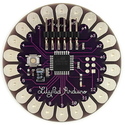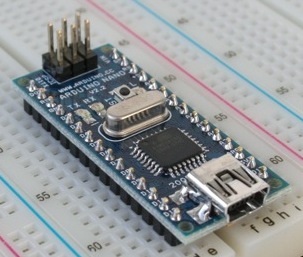Open MCU module, hacking contest launch
Jan 16, 2009 — by Eric Brown — from the LinuxDevices Archive — 3 views The Arduino Project has published a new “open,” Atmel-based microcontroller (MCU) module design, called the Duemilanove. Meanwhile, mesh-networking gear vendor Libelium, which uses Arduino designs in some products, has launched its second-annual contest for the “coolest” project based on an Arduino… microcontroller module.
The Arduino Project has published a new “open,” Atmel-based microcontroller (MCU) module design, called the Duemilanove. Meanwhile, mesh-networking gear vendor Libelium, which uses Arduino designs in some products, has launched its second-annual contest for the “coolest” project based on an Arduino… microcontroller module.
(Click for larger view of the Arduino Lilypad)
The Arduino line now includes almost a dozen MCU module designs based on Atmel microcontrollers. The designs are intended to serve as open source hardware platforms for hobbyists, artists, and designers. They lack adequate processing power to run Linux, but can interface with Linux systems over USB or serial connections.
For those wishing to use Arduino designs to prototype I/O devices, Arduino offers a Linux-compatible, open source electronics prototyping SDK (software development kit). The kit is based on “Wiring” and “Processing” environments, and is claimed capable of interacting with software such as Flash, Processing, or MaxMSP. The project recently released a 64-bit AMD port of the kit.
New “Duemilanove” MCU module
Like the flagship Arduino board (farther below), the new Arduino Duemilanove (“2009”), pictured below, is based on Atmel's ATmega168 microcontroller, powered by a 16MHz, 8-bit RISC core. It offers 16KB of flash memory, a USB port, and 14 digital I/O pins, of which six can be used as PWM outputs, says the project. The Duemilanove is also equipped with six analog inputs, a 16MHz crystal oscillator, an ICSP header, and a reset button. A power jack is provided, although the board can also be powered via USB or battery.

Duemilanove
Another interesting Arduino design is the LilyPad Arduino (pictured top of page). A two-inch round microcontroller disc, the Lilypad is designed for wearables and e-textiles. It can be sewn into fabric or similarly mounted power supplies, sensors, and actuators with conductive thread, says the project. Based on the low-power ATmega168V version of the ATmega168, the LilyPad Arduino was designed by Leah Buechley and SparkFun Electronics.
The original Arduino Diecimila (below) is built around either the ATmega8 or the ATmega168. It offers 11 digital and six analog inputs that support a wide variety of sensors, including GPS, temperature, humidity, light, presence, and pressure. The Arduino can also control lights, motors, and other actuators.

Arduino's original Diecimila board
Last year, Arduino shipped the Arduino Nano, which offers the same functionality as the Arduino Diecimila, but is available in a “breadboard-ready” design that measures only 0.73 x 1.70 inches. Manufactured by US-based Gravitech, the Nano is equipped with an ATmega168 microcontroller clocked at 16MHz. It has 16KB of flash and 1KB of RAM. I/O includes a USB port with Mini-B jack, and a set of 14 digital I/O pins and eight analog inputs.

Arduino's new Nano board
 Libelium's Arduino-based SquidBee mote sensor |
Open Hardware Contest
Arduino Open Hardware Contest host Libelium uses the Arduino microcontroller in several designs, including its ZigBee-based SquidBee “mote” sensor (pictured at right), and a SquidBee-compatible x86-based multi-protocol mesh router called the Meshlium, which ships with a Debian GNU/Linux-based operating system. Libelium's Arduino contest is open to “hackers interested in design, robotics and electronics,” says the company, which invites developers to send their “coolest” Arduino designs.
 Last year's “art hack” winner: the Arduino-based “Momo” navigational device (Click to enlarge) |
The project entries, which are provided in the form of videos, documentation, and tutorials, can be registered as “life hacks,” “art hacks,” or “robotics hacks.” All entries must be received by April 15. Last year's winners included a security system, a modular robot, and a sweater-clad haptic navigational device (pictured).
Winners will receive the following prizes, says Libelium:
- 1st — Arduino GPS, GPRS, SD, and solar modules
- 2nd — GPS, SD, and SD and solar modules
- 3rd — GPS and SD modules
Availability
More information on the Arduino Open Hardware Contest may be found on this Libelium page. More on the Arduino Project should be here.
This article was originally published on LinuxDevices.com and has been donated to the open source community by QuinStreet Inc. Please visit LinuxToday.com for up-to-date news and articles about Linux and open source.